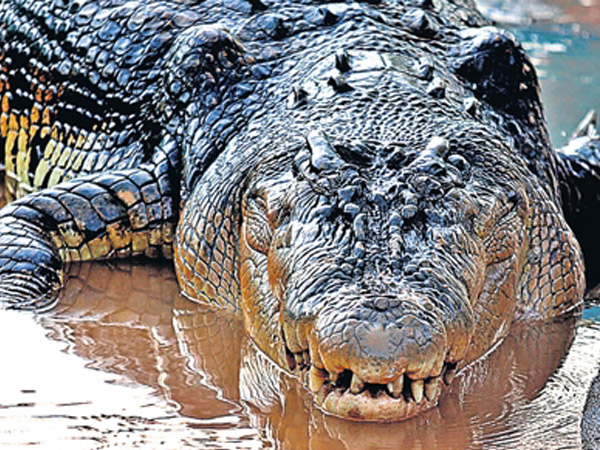World’s largest crocodile Lolong is dead
TAGUM CITY— Lolong, the world’s biggest reptile in captivity, is dead.
The 20.4-foot (6.12-meter) saltwater crocodile died at its pen in Consuelo village, Bunawan town, Agusan del Sur province, around 8:30 p.m. on Sunday, according to Mayor Edwin Elorde.
“He refused to eat since last month and we noticed a change in the color of his feces,” Elorde told the Inquirer by mobile phone. “Our personnel also noticed an unusual ballooning of the reptile’s belly.”
Rowena Bunawan, media coordinator of Bunawan, told the Philippine Daily Inquirer by phone that Lolong was declared dead Dr. Alexander Collantes, animal doctor at the Davao Crocodile Park.
“The croc did not eat his usual meal late last month. Experts will still investigate the cause of death,” she said.
As early as after Typhoon Pablo hit Agusan del Sur and other parts of Mindanao last December, Lolong, showed unusual changes, local officials said.
Captured in the Agusan Marsh on Sept. 3, 2011, Lolong is believed to have eaten a man who went missing in July and bitten off the head of a 12-year-old girl in 2009.
Since its capture and subsequent measurement and confirmation of international crocodile experts that Lolong was the planet’s largest in captivity, Bunawan town has become a tourism draw, with revenues running in the millions of pesos.
Elorde said the crocodile was last observed “as very active” on Saturday night, and its death over the weekend was somehow unexpected.
“We checked him up last Jan. 23 and we thought his condition would improve. We’re very saddened this happened,” the mayor said.
The resort in upland Consuelo village where the crocodile had been kept was drawing hundreds of eager local tourists daily, generating up to P20,000 of gate receipts per day, the mayor said. Elorde ordered the closure of the park on Sunday hours before Dr. Collantes declared the reptile dead.
He had asked Collantes to examine the animal after park personnel reported the crocodile’s condition early on Sunday.
Elorde admitted the crocodile’s death will adversely affect local tourism.
“But we have to move on. Lolong had put Bunawan on the map by being the world’s largest reptile and that’s a record that can’t be erased anymore. Aside from Lolong, we have also been promoting Agusan Marsh (for tourism).
He said experts from the Protected Areas and Wildlife Bureau (PAWB) were expected to arrive in Bunawan on Monday to investigate.
The official suspected that the extreme drop in temperature in Bunawan early this year had an adverse effect on Lolong.
“It was very cold here in Bunawan last month, so that might have affected him,” the mayor said, even as he stressed experts would examine the beast to really ascertain the cause of its death.
Elorde said the local government will ask assistance from the National Museum to have Lolong’s body preserved.
“In that way, people can still look and marvel at him,” the official said.















